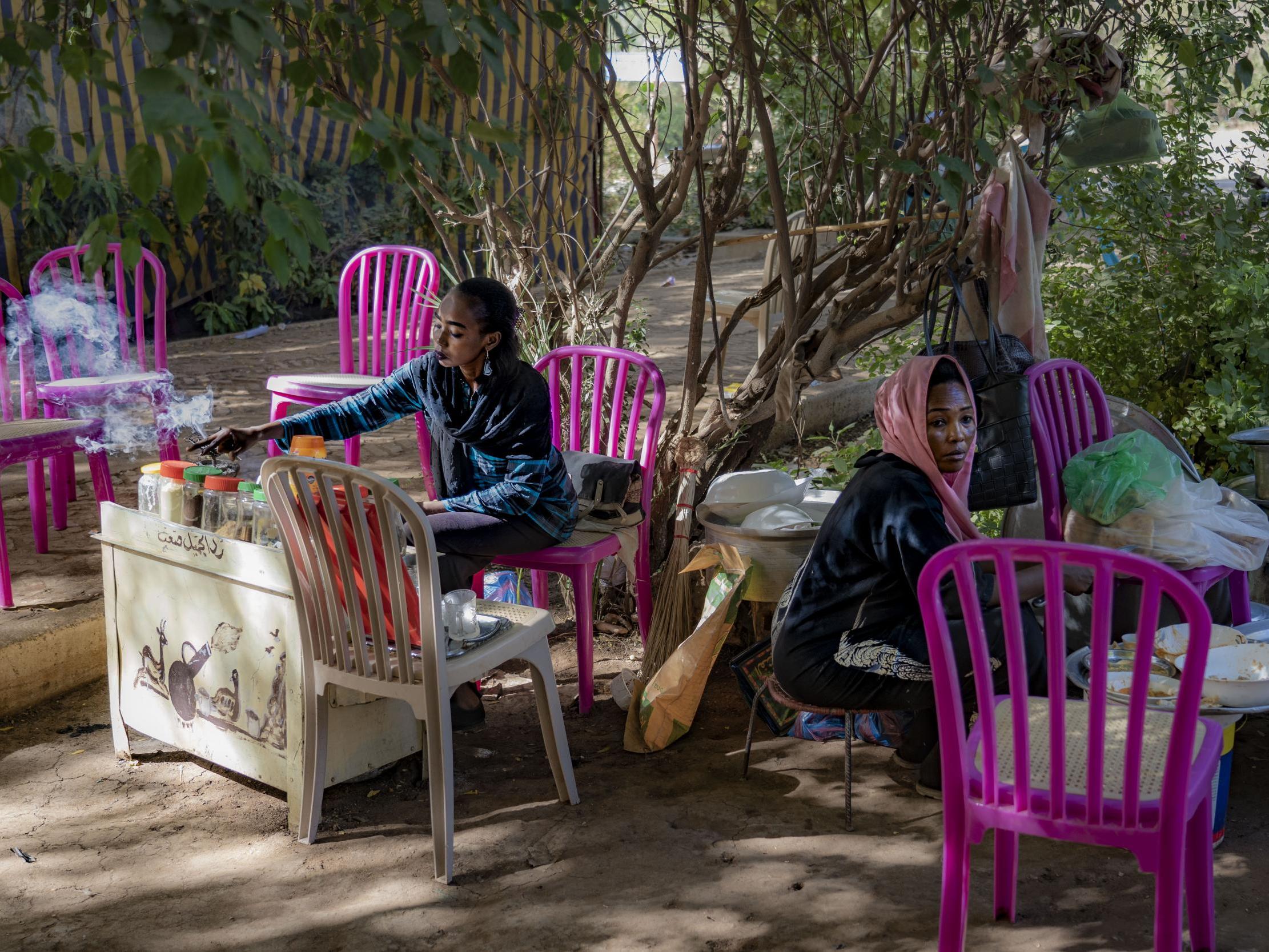You won’t have heard about Sudan’s revolutionary street sellers – but that may be about to change for good
They’re the first to disappear when security forces storm encampments and often the hardest and last to be found. Their names rarely become hashtags or Facebook pages, writes Bel Trew


The heart-breaking plea cuts through the air like a slap. “Please. I need help, I can’t have this baby,” Sara says.
The Sudanese tea seller was drugged and raped by men she believes are part of feared paramilitary group the Rapid Support Forces, just after they cleared the main protest camp in Khartoum in June.
Sara is in her twenties, divorced, penniless and malnourished. She was told she could take a pill to make the problem go away. She did not realise this far into the pregnancy, this is no longer an option. She also did not know that the surgery required may not be available in Sudan, where abortion is a serious taboo.
The mother-of-two was one of the 500 or so tea sellers who made food and drinks for the revolutionaries, supporting Sudan’s uprising which ousted veteran dictator Omar al-Bashir in April. Nicknamed the “tea ladies”, the food and beverage vendors are a ubiquitous presence on Sudan’s street corners providing refreshments for a nation.
They are also among the most vulnerable segments of Sudanese society, often internally displaced from war-torn areas of the country like Darfur and South Kordofan. And so penniless, sometimes homeless and often lacking identification documents, they were the hardest hit during the 3 June crackdown on the Khartoum sit-in. Dozens are believed to have been raped, beaten or killed during that week. Six tea sellers are still missing.
Sara barely made it out alive. “They arrested me when I went back to get my tea equipment after the sit-in was cleared. The street was crawling with security forces,” she continues.
“Four men stopped me and arrested me. They used this spray on me and I fainted.
“I felt like I couldn’t breathe when I woke up. I found myself in a different place, lying on the street. I was bleeding between my legs and wounded.”
Several women’s associations were contacted to help Sara, and activists are working on her case that they say echoes stories told by dozens of other tea sellers.
“There was a systematic targeting of tea sellers, because they were feeding the people and providing services for the sit-in,” says Awadeya Mahmoud Koko founder and head of Sudan’s tea sellers union that now boasts nearly 30,000 members.
The 56-year-old matriarch, herself displaced from South Kordofan, has spent decades fighting for the rights of women just like her. She was even sent to debtor’s prison a few years ago when she failed to pay back loans secured to try to help penniless women get back on their feet.
“Of all the classes we are the worst affected by the clearing of the sit-in and the violence. Most of the tea sellers don’t have phones, on 3 June they didn’t know the attack was coming, they don’t have a network to support them,” Mrs Koko continues.
“We are a weak segment of society and so the security forces do not hesitate to violate us.”
Few foreign observers realise the important role street sellers play in the revolutions that have swept across the squares of countries from Egypt to Iraq. So often our TV screens and newspapers are filled with activists who speak English who have access to social media and smartphones.
But across the uprisings I have covered, the tea sellers, the falafel makers, the mussel men, the batata boys, the tuk-tuk drivers, the candy floss guys wielding tall sticks of neon pink were integral bastions of the protests, sit-ins and even the frontline against raiding security forces.
Each time they became a vital part of the unique infrastructure of revolutionary encampments. In those unique meeting and melting points, fiercely close friendships were forged across the most impossible of social boundaries.
But when the security forces storm these sit-ins, the vulnerable workers are the first to disappear, the hardest and so last to be found. Their names rarely become hashtags or Facebook pages.
Mrs Koko is part of a movement to change that starting in Sudan: she hopes unions like hers can be rolled out across the region raising the voice of the weakest.
In the aftermath of the summer’s attacks she visited the homes of 150 tea sellers who were injured. Her organisation is trying to find the six women who are currently missing – launching campaigns to draw public attention to the disappeared.
After a similar media campaign, a seventh woman, Amal, reappeared months after she vanished on 3 June. She had been dumped by the side of the street so traumatised she could barely talk. Mrs Koko’s union has arranged psychiatric care to Amal. They are reaching out to Sara.
“Before now we had so few ways of fighting for our rights,” Mrs Koko says, from a meeting of tea sellers.
“The world must know. This must change.”
Join our commenting forum
Join thought-provoking conversations, follow other Independent readers and see their replies
Comments